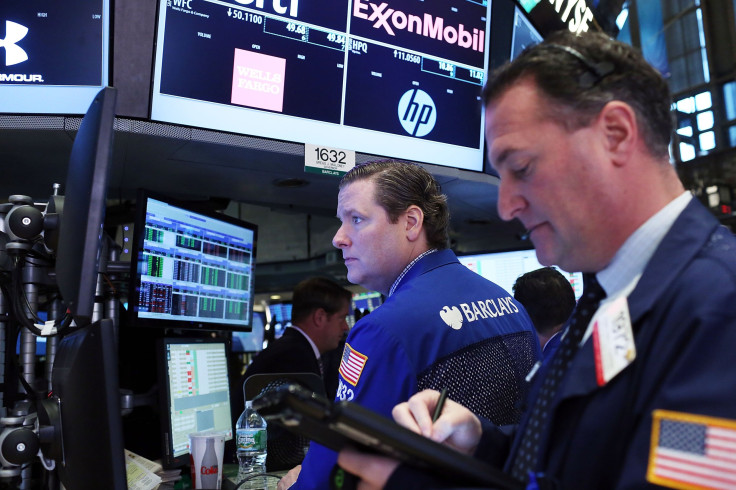Dow Jones Industrial Average Up After European Central Bank Expands Economic Stimulus

This story was updated at 4:20 p.m. EST.
It was a roller-coaster ride for U.S. stocks on Thursday after the European Central Bank announced further economic stimulus efforts in a bid to tackle persistently low inflation in the 19-country currency bloc. Major European markets rallied shortly after the move as bank stocks jumped more than 7 percent, but they ended lower for the day.
The ECB cut its deposit facility rate deeper into negative territory, from minus 0.3 percent to minus 0.4 percent, and expanded its asset-purchase program to 80 billion euros a month ($88 billion) from 60 billion euros ($66 billion).
“With bank balance sheets strained across the euro area and real rates negative in several European countries, the evolution of ECB policy will have wide-ranging implications for the global financial system and the outlook for European banks,” said a note from Washington-based research firm Height Securities.
After a nearly 300-point swing throughout the day, the Dow Jones Industrial Average (INDEXDJX:.DJI) closed down just 5.23 points, or 0.03 percent, to 16,995.13. The broader Standard & Poor’s 500 index (INDEXSP:.INX) saw similar trading activity before closing slightly up, by 0.31 points, or 0.02 percent, to 1,989.57. The Nasdaq composite (INDEXNASDAQ:.IXIC) dropped 12.22 points, or 0.26 percent, to 4,662.16.
The Dow and S&P are both down more than 2 percent for the year and up more than 6 percent and 7 percent, respectively, from a year-to-date low point struck on Feb. 11.
Eight out of the 10 S&P 500 sectors were down Thursday. Materials and telecommunications stocks closed up. Merck & Co. Inc. (NYSE:MRK) led Dow gains while E I Du Pont De Nemours and Co. (NYSE:DD) led declines.
The euro slid against the dollar after the announcement but was recovering after ECB President Mario Draghi dismissed implementing a two-tier deposit system for banks. That move would have signaled to investors that further dips in the deposit rate were planned later this year, something the ECB would like to avoid.
Thursday’s move to expand the asset-purchasing program, which pumps new money into the economy by buying bonds from financial institutions, was widely expected last December. But the ECB dashed expectations at the time by not delivering the kind of so-called stimulus bazooka it announced on Thursday.
“The ECB deserves credit for learning from its mistake in December,” Jonathan Loynes, chief Europe analyst for Capital Economics, said in a note. “But there is no guarantee that its latest ‘bazooka’ will be any more effective than previous ones in securing the strong and sustained growth required to eliminate the threat of deflation in the currency union and allow the peripheral countries to tackle their debt problems.”
European stocks were largely up ahead of and shortly after the ECB announcement but ended the day in negative territory.
In Europe, the broad Stoxx Europe 600 index closed down 1.5 percent to 334.04. The Paris-based CAC 40 lost 1.7 percent to 4,350 while London’s FTSE was down 1.78 percent to 6,037. Frankfurt’s DAX dropped 2.31 percent to 9,498.
Oil prices fell Thursday after hopes were dashed that oil producers were going to meet March 20 to discuss stabilizing crude prices. An anonymous OPEC source told Reuters that oil ministers don’t plan to meet because Iran, which recently began exporting oil after sanctions against it were partially lifted in January, has not yet committed to joining the effort to stabilize crude prices.
U.S. West Texas Intermediate fell 1.15 percent to $37.85 per barrel for April delivery on the New York Mercantile Exchange. Brent crude, the other major global benchmark, fell 2.24 percent to $40.15 for May delivery on the London ICE Futures Exchange.
The benchmark U.S. 10-year Treasury edged up by early Thursday afternoon to 1.94 from its previous day close of 1.91 percent. The bond yield typically rises when investors are more confident about the markets and falls when concerns flare. Gold, another so-called safe-harbor investment, gained 0.86 percent to $1,268.20 per troy ounce. Gold prices tend to rise as confidence in the markets falls.
Major Asian markets ended the day mixed, with China’s CSI 300 index of the mainland’s largest companies shedding 1.91 percent to 3,013. Hong Kong’s Hang Seng closed down 0.06 percent to 19,984. Japan’s Nikkei gained 1.26 percent to 16,852. Australia’s S&P/ASX 200 lost 0.14 percent to 5,150, while South Korea’s main Kospi Index edged down 0.1 percent to 1,956.
© Copyright IBTimes 2024. All rights reserved.





















